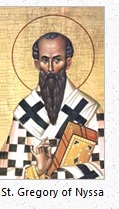
From
a sermon on Ecclesiastes
by Saint Gregory of Nyssa, bishop
There is a time to be born and
a time to die
 t seems
to me that the birth referred to here is our salvation, as is suggested by
the prophet Isaiah. This reaches its full term and is not stillborn when,
having been conceived by the fear of God, the soul’s own birth pangs
bring it to the light of day. We are in a sense our own parents, and we give t seems
to me that the birth referred to here is our salvation, as is suggested by
the prophet Isaiah. This reaches its full term and is not stillborn when,
having been conceived by the fear of God, the soul’s own birth pangs
bring it to the light of day. We are in a sense our own parents, and we give
 birth to ourselves by our own free choice of what
is good. Such a choice becomes possible for us when we have received God into
ourselves and have become children of God, children of the Most High. On the
other hand, if what the
Apostle [1]
calls the form of Christ has not been produced in us, we abort ourselves.
The man of God must reach maturity. birth to ourselves by our own free choice of what
is good. Such a choice becomes possible for us when we have received God into
ourselves and have become children of God, children of the Most High. On the
other hand, if what the
Apostle [1]
calls the form of Christ has not been produced in us, we abort ourselves.
The man of God must reach maturity.
Now if the meaning of a timely
birth is clear, so also is the meaning of a timely death. For Saint Paul
every moment was a time to die, as he proclaims in his letters: I swear
by the pride I take in you that I face death every day. Elsewhere he
says: For your sake we are put to death daily and we felt like men condemned
to death. How Paul died daily is perfectly obvious. He never gave himself
up to a sinful life but kept his body under constant control. He carried
death with him, Christ’s death, wherever he went. He was always being
crucified with Christ. It was not his own life he lived; it was Christ who
lived in him. This surely was a timely death—a death whose end was true
life.
I put to death and I shall
give life, God says, teaching us that death to sin and life in the Spirit
is his gift, and promising that whatever he puts to death he will restore
to life again.
—Saint Gregory of Nyssa,
bishop
Office of Readings, Tuesday
Seventh Week in Ordinary Time
___________
1.
That is, Saint Paul. See Galatians 4:19.
|




 birth to ourselves by our own free choice of what
is good. Such a choice becomes possible for us when we have received God into
ourselves and have become children of God, children of the Most High. On the
other hand, if what the
Apostle [
birth to ourselves by our own free choice of what
is good. Such a choice becomes possible for us when we have received God into
ourselves and have become children of God, children of the Most High. On the
other hand, if what the
Apostle [